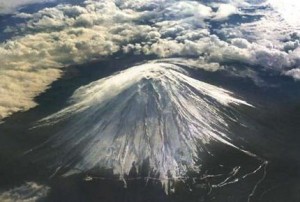Permafrost on Mt. Fuji is Dwindling
 The permafrost near the summit of Mt. Fuji (3,776 m) has been thawing at an alarming rate during the last 30 years due to warming global temperatures, according to research conducted by Shizuoka University and Japan’s National Institute of Polar Research (NIPR). Permafrost is a subsurface layer of soil that remains frozen for at least two years.
The permafrost near the summit of Mt. Fuji (3,776 m) has been thawing at an alarming rate during the last 30 years due to warming global temperatures, according to research conducted by Shizuoka University and Japan’s National Institute of Polar Research (NIPR). Permafrost is a subsurface layer of soil that remains frozen for at least two years.The research group’s first glaciological survey, conducted from 1970 to 1976, showed the lower altitudinal limit of the permafrost at 3,100 to 3,300 meters. The second survey, from 1998 to 2001, revealed the retreat of the permafrost layer to the altitudes of 3,300 to 3,500 meters, 200 meters higher than the previous data. The recent survey, 2007 to 2010, showed a further, more rapid decline in permafrost extent.
Some alpine plant species on Mt. Fuji are thought to survive only in permafrost environments. Further melting of the permafrost associated with ongoing global warming could have profound negative impacts on the unique ecosystems to which they belong.
Average global temperature for the last 100 years (from 1906 to 2005) showed an increase of 0.7 degrees Celsius. At the top of Mt. Fuji, in contrast, average temperature rose by 1.1 degrees over the past 30 years, a rate of warming much faster than expected.
You can return to the main Market News page, or press the Back button on your browser.

